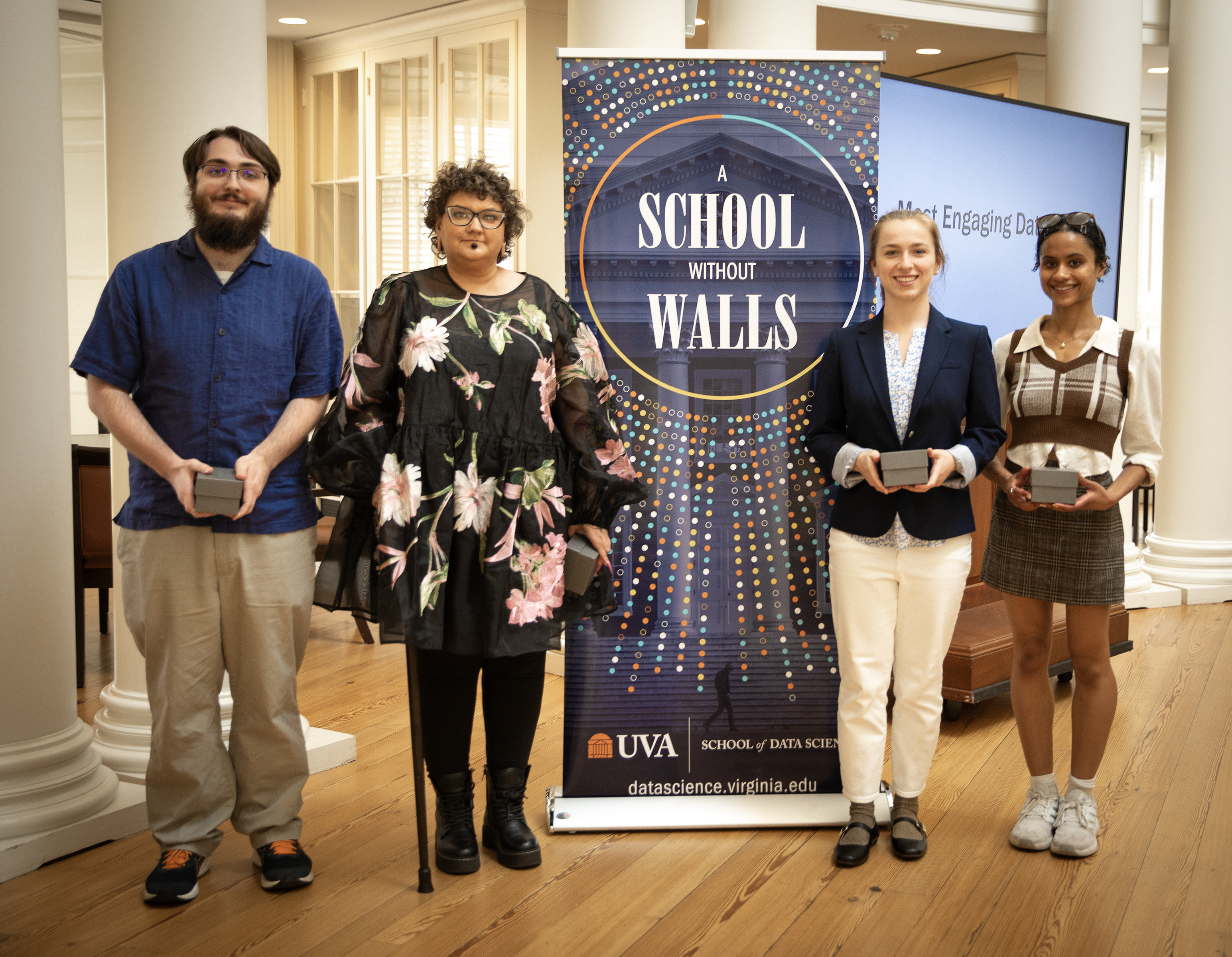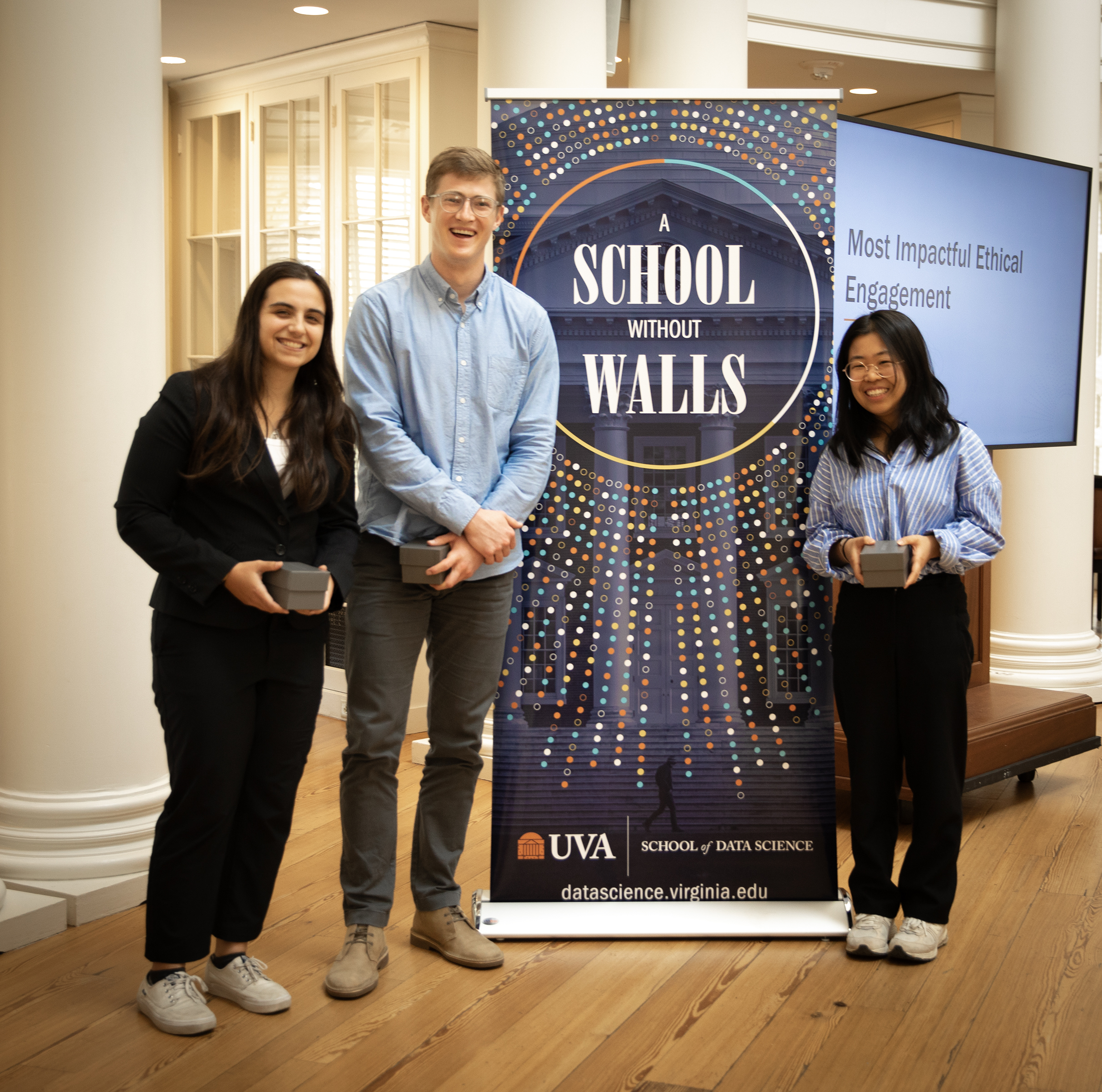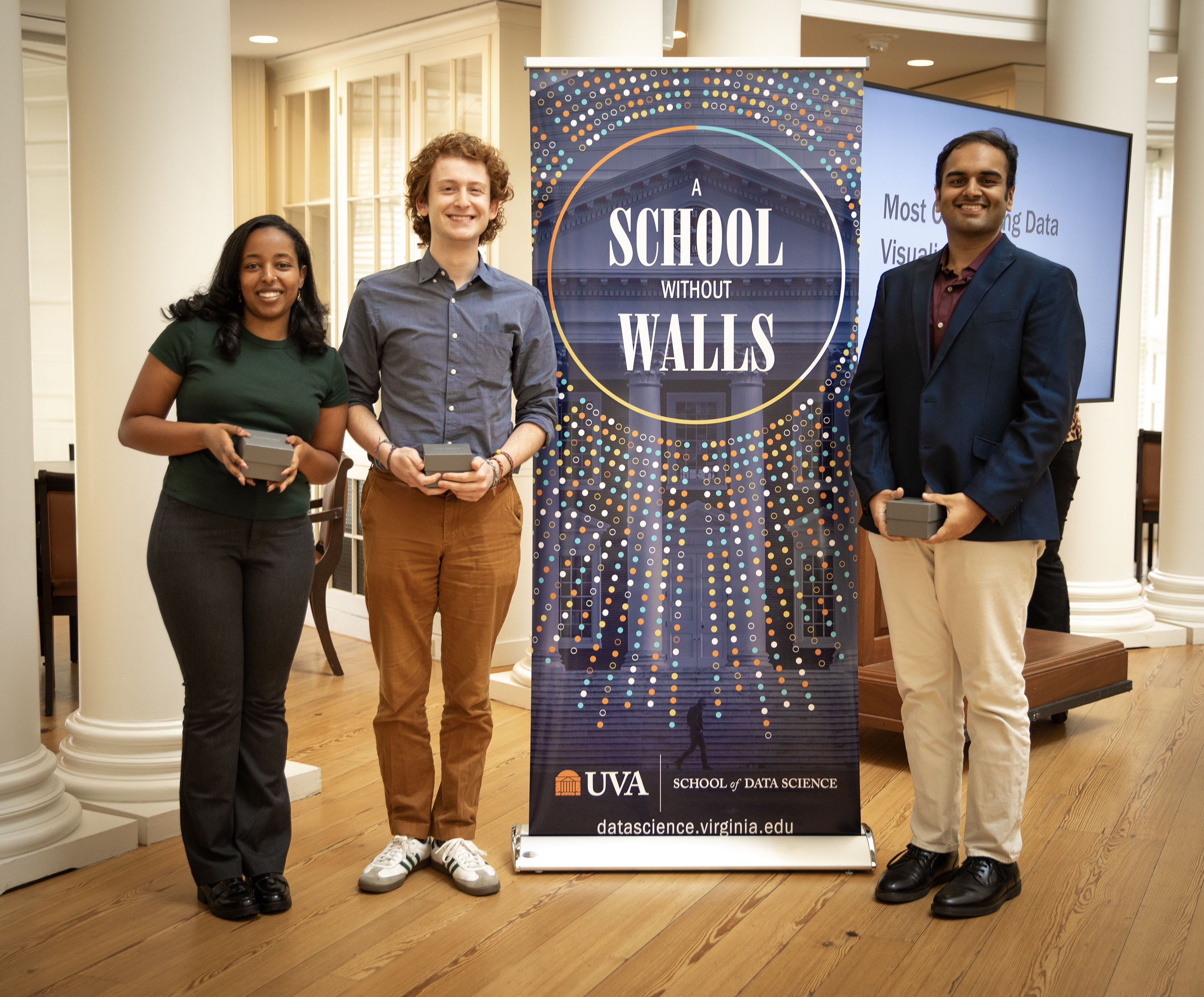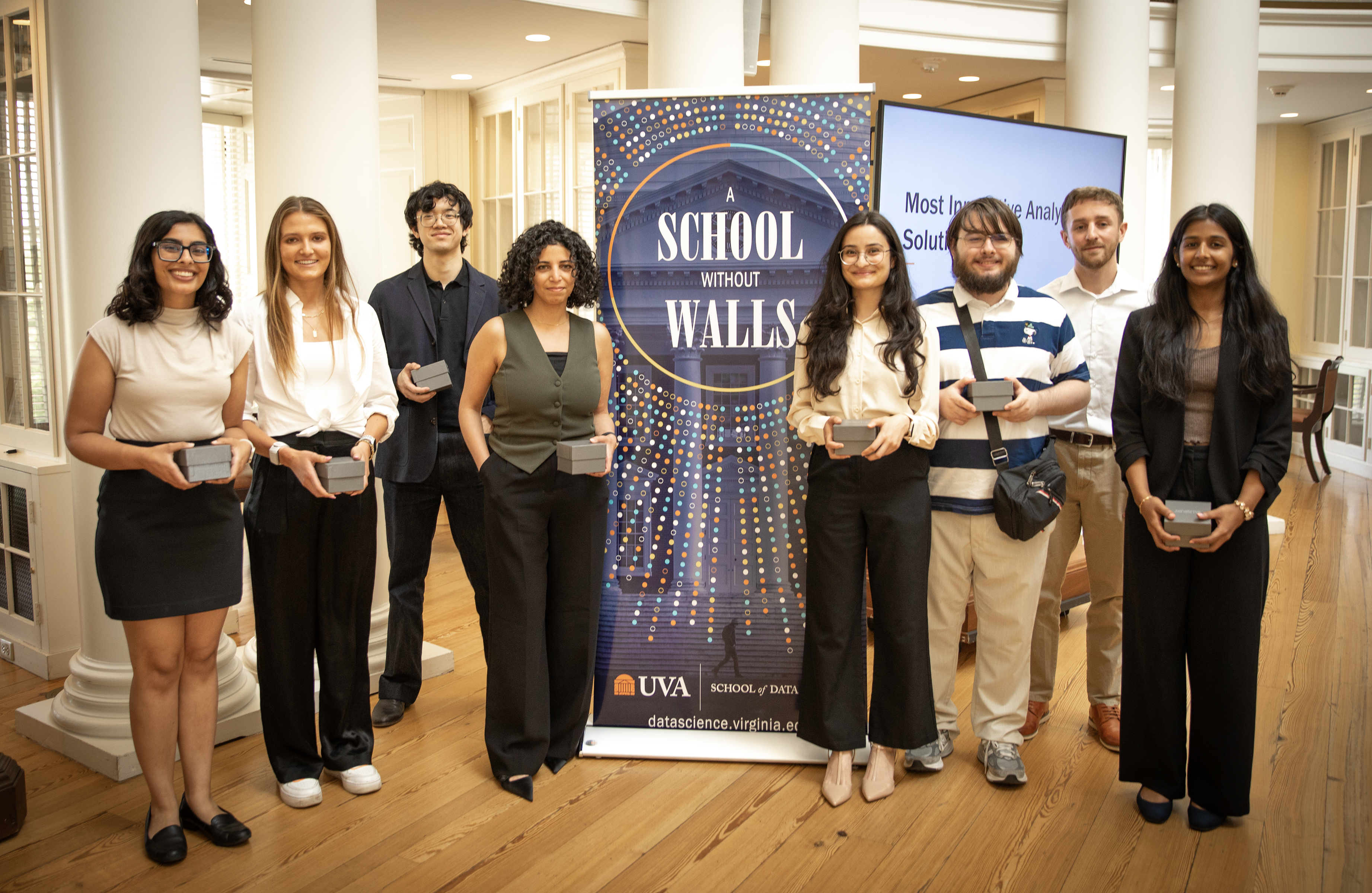
Master’s in Data Science Students Showcase Real-World Solutions in 2025 Capstone Presentations
As the University of Virginia School of Data Science celebrated the latest cohort of its M.S. in Data Science (MSDS) program, the annual capstone presentations provided a powerful glimpse into the practical, impactful, and often visionary work students are doing at the intersection of data, technology, and society. Capstone projects are the culmination of the MSDS program—a year-long immersive experience where student teams partner with industry sponsors, government agencies, and academic researchers to tackle real-world problems using the full range of data science tools and techniques acquired in the classroom.
“We are very fortunate that so many sponsors bring important challenges, dreams, and data to the UVA School of Data Science and that our students deliver results with their skills, energy, and creativity,” said Associate Professor Adam Tashman, who serves as capstone director for the master’s program. “This keeps the capstone flywheel spinning, bringing new sponsors and problems to the table, which is very exciting.”
This year’s presentations highlighted the versatility and breadth of the data science discipline, with 20 student teams exploring projects that spanned fields such as public health, transportation, artificial intelligence, astronomy, education, law enforcement, and biomedical science. From optimizing radio surgical dose planning for tumor control to creating computer vision tools for surgical flowchart digitization, these projects showcased not only technical sophistication but also a commitment to ethical responsibility and social impact.
Four projects stood out among the rest, earning top honors in categories that recognize storytelling, ethics, and visual communication in data science:
Most Engaging Data Story: Counseling & Psychological Services at UVA
Winner of “Most Engaging Data Story,” the project “Understanding Health Event Distributions and Trends in Health Services Utilization in Students using Counseling & Psychological Services (CAPS) at UVA” tackled a sensitive and timely topic: student mental health. Sponsored by UVA Student Health and Wellness, the team analyzed over 137,000 CAPS visits from more than 17,000 students between January 2017 and August 2024. The data was rich with demographic details, diagnosis codes, and temporal patterns, enabling students to uncover meaningful insights about who is using these services—and when.
The project’s findings were eye-opening: female students accessed CAPS services nearly twice as often as male students. Diagnoses were dominated by anxiety, depression, and eating disorders. Notably, the team found significant spikes in PTSD diagnoses following the 2022 on-campus shooting, with mental health patterns varying by academic school. The narrative was deeply engaging, combining rigorous analysis with a compassionate lens to tell a human-centered story grounded in data.

Team: Gabriella Cordelli, Georgia Davidson, Taylor Skimp, Lindley Rose Slipetz
Sponsors: Chris Holstege, Rita Farah (UVA Student Health and Wellness)
Faculty Mentors: Mai Dahshan, Adam Tashman
Most Impactful Ethical Engagement: Identifying Human Trafficking Tattoos
In a project that blended cutting-edge AI with a humanitarian mission, the team behind “Automate the Identification of Tattoos Often Used by Human Traffickers to Brand their Victims” received the award for “Most Impactful Ethical Engagement.” Sponsored by AINA Technologies and supported by Adam Tashman, the goal was to support law enforcement and frontline workers in identifying potential victims of trafficking through tattoo recognition—an area where quick identification can make a life-saving difference.
Starting with a modest dataset of 60 known trafficking-related tattoos, the team expanded and augmented the images to create a dataset of 900. Using the MOMENT data model for feature extraction, they trained a model that achieved 89.11% top-one accuracy and nearly 100% top-20 accuracy. Beyond technical performance, the team introduced a three-tier classification system to enhance accuracy and reduce false negatives, cutting missed identifications from 11% to just 4.7%. The model demonstrated fast processing times and consistent performance across different skin tones and lighting conditions, an essential factor for real-world application.
This project exemplifies how ethical considerations can—and must—be central to data science solutions. It also demonstrates how AI, when applied with care, can serve vulnerable populations.

Team: Cassidy Cubra, Alanda Guan, Brennan Thompson
Sponsors: Kim Adams, Shweta Jain (AINA Technologies)
Faculty Mentor: Adam Tashman
Most Compelling Data Visualizations: Multimodal Retrieval in Education
The award for “Most Compelling Data Visualizations” went to the team researching “Using Educational Data to Explore Multimodal (Audio, Video, & Text) LLM Retrieval Techniques.” Sponsored by Data Science Fellow Lucas McCabe at LMI and supported by Associate Professor of Data Science Brian Wright, this project examined how visual and textual data could be combined to improve learning outcomes in a UVA machine learning course.
Leveraging Retrieval Augmented Generation (RAG), the team used OpenAI models for image embeddings and Sentence Transformers for textual context. Their visualizations clearly illustrated the performance of different retrieval methods across varied types of questions. For instance, charts showed that adding images significantly improved context recall for general questions, while specific queries benefited less. Their work offered a nuanced view of how data modality impacts learning, and their visual communication made technical results accessible to both educators and data scientists.
Future directions include constructing a knowledge graph to refine retrieval and developing a “small aging RAG” model that adjusts strategies based on question type. With its intuitive graphics and clear storytelling, this capstone exemplified how visualization can transform raw data into actionable insight.

Team: Vishwanath Guruvayur, Luke Napolitano, Doruk Ozar, Bereket Tafesse
Sponsors: Lucas McCabe (LMI)
Faculty Mentor: Brian Wright
Most Innovative Analytical Solution: Anthropic LLM as a Judge 2025
The award for “Most Innovative Analytical Solution” went to the Deloitte-sponsored team behind “Anthropic LLM as a Judge 2025.” This project explored how to evaluate large language models (LLMs) by combining traditional NLP metrics with “LLM-as-a-judge” methods, offering a deeper look into model performance.
Key findings included 84% accuracy (43% F1) from DeepEval on toxicity detection, 85% accuracy from Claude 3.5 for bias and tone identification, and 85% accuracy from Arise AF Phoenix on hallucination detection. DeepEval also outperformed standard NLP metrics in summarization tasks, and a custom readability score surpassed Claude’s. Retrieval accuracy varied, with MLFlow best for general tasks and scikit-learn for industry-specific ones.
The team’s approach demonstrated how layered evaluation techniques can reveal model strengths and weaknesses, with future plans to scale the framework across more domains and models.

Team: Afnan Alabdulwahab, Disha Dubey, John Hope, Chloe Japic, Colby Le, Sanjana Srivastava, Patrick Stone, Disha Trivedi
Sponsors: Megan Carper, Charlie Evert (Deloitte)
Faculty Mentors: Aidong Zhang, Adam Tashman
A Range of Innovation
Other projects from the capstone cohort further demonstrated the program's interdisciplinary approach and emphasis on collaboration. Among the highlights:
- “An ML Approach to Multi-Parameter Project Optimization at the ALMA Observatory” applied predictive modeling to optimize global astronomical research.
- “Temporal Anomaly Detection in Multi-Spectral Satellite Imagery” used time-series modeling for environmental and defense-related insights.
- “Workforce Data Analysis Project to Assess Internship and First Destination Outcomes Data of UVA Students” provided valuable feedback to career services and university administration.
- “Global Data Science Fellowship: At the Intersection of Malnutrition and Tuberculosis in Tanzania” blended field research with data modeling to address twin health crises in East Africa.
Other projects addressed dynamic traffic optimization, body location prediction in abduction cases, revenue modeling in clinical settings, and automated glaucoma screening using AI. Across the board, students demonstrated a deep understanding of both domain knowledge and advanced data techniques—from deep learning and natural language processing to Bayesian inference and computer vision.
Looking Ahead
As these MSDS students prepare to graduate this spring, their capstone projects serve not only as technical portfolios but as evidence of the real-world change that data science can bring about. From improving mental health services to combating human trafficking and enhancing education through AI, these projects are more than academic exercises—they are blueprints for a better, data-informed future.
